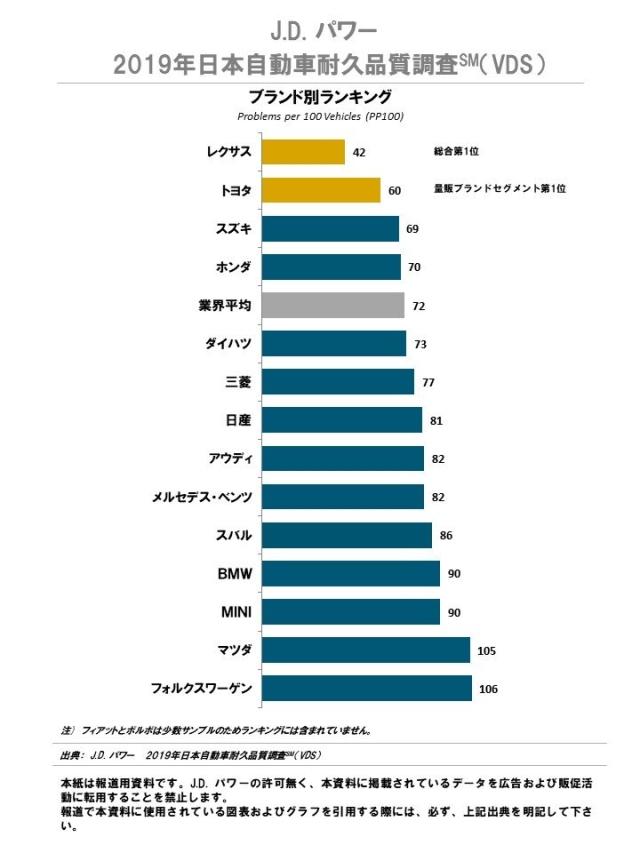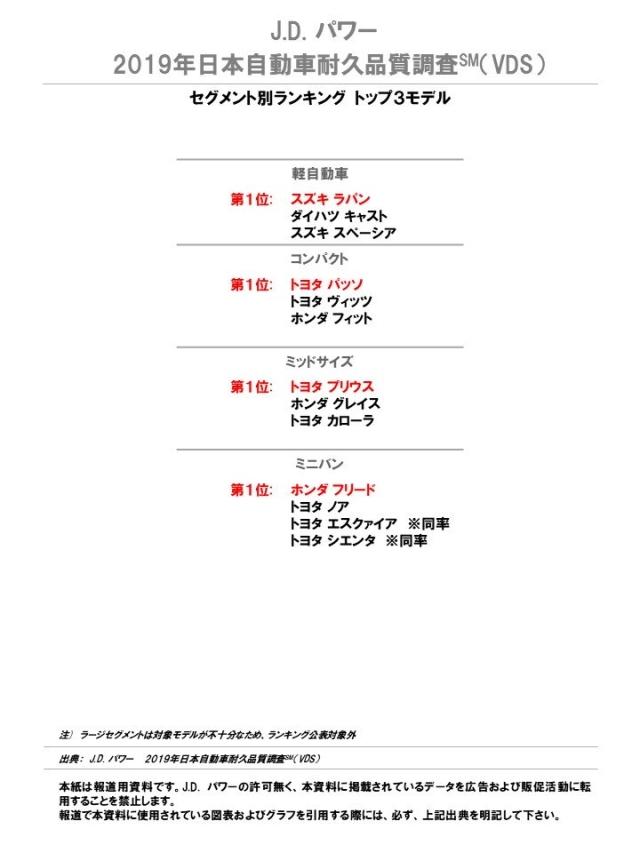CS(顧客満足度)に関する調査・コンサルティングの国際的な専門機関である株式会社J.D. パワー ジャパン(本社:東京都港区、代表取締役社長:山本浩二、略称:J.D. パワー)は、2019年日本自動車耐久品質調査SM(Vehicle Dependability Study、略称VDS)の結果を発表した。
本調査では、新車購入後37~54ヶ月経過したユーザーを対象に8分野*1177項目でユーザーの不具合経験を聴取している。すべての不具合項目は車100台当たりの不具合指摘件数(Problems Per 100 vehicles = PP100)として集計され、数値が低いほど品質が高いことを示す。
*1「外装」「走行性能」「装備品/コントロール/ディスプレイ」「オーディオ/コミュニケーション/エンターテインメント/ナビゲーション(ACEN)」「シート」「空調」「内装」「エンジン/トランスミッション」の8分野
業界平均の不具合レベル、前年よりわずかに改善
- 総合不具合指摘件数は72PP100、前年の75PP100に比べ、3ポイント減少した。分野別の変化はわずかだが、「外装」(12.9PP100、前年比-1.6ポイント)、「エンジン/トランスミッション」(10.7PP100、前年比-1.1ポイント)の他、8分野中6分野で前年に比べ不具合指摘件数が減り、業界全体として耐久品質の改善は進んでいる。
- ブランド別では、2018年、2019年とも調査対象となった14ブランドのうち、10ブランドで不具合指摘件数が減り、耐久品質が改善した。
Bluetooth®機能、装備率上がるも不具合指摘が顕著に
- 本調査では装備率についても聴取しているが、各種機能・装備品のうち、前年より装備率が大きく上昇したのは、車線逸脱警告システム(装備率29%、前年比+14パーセンテージポイント)、衝突回避/警告システム(45%、+12)、パーキングアシストシステム(34%、+7)、車載ブルートゥース(Bluetooth®)による携帯電話/オーディオ接続機能(64%、+7)などである。
- このうちBluetooth®は不具合指摘数が前年の1.9PP100から2.3PP100に0.4ポイント増え、VDS不具合総項目数177項目中2番目に不具合指摘が多かった。
ディーゼル車のエンジン/トランスミッションの耐久品質に課題
- 「エンジン/トランスミッション」に関する不具合指摘は、業界平均で10.7PP100、前年比-1.1ポイントで改善した。しかしエンジンタイプ別にみると、ディーゼルエンジン車は24.0PP100、前年比+5.5ポイントで不具合指摘件数が増加している。詳細項目としては、エンジン警告灯が点灯、排気系の不具合等について不具合指摘の増加が確認されている。
J.D. パワー オートモーティブ部門 シニアディレクター 川橋 敦は、本調査結果に対し次の様にコメントしている。「車両全体の耐久品質の業界平均水準はわずかに改善したが、Bluetooth®接続の不具合やディーゼル車のエンジン/トランスミッションの不具合といった特定領域での不具合指摘件数が増加する傾向がみられた。
特にBluetooth®については装備率や利用率の増加が不具合指摘につながっている可能性がある。Bluetooth®接続に関する不具合は一概に車両品質だけの問題とはいえないが、今後装備率やユーザーの利用率がますます高まることが予想され、ユーザーの厳しい評価は無視できない。自動車メーカーによる積極的な改善への取り組みが望まれる。」
J.D. パワー 2019年 日本自動車耐久品質調査の総合ランキングは下記の通り。
【ブランドランキング】
<総合> レクサス(42PP100)
昨年に続き、総合第1位
<量販ブランドセグメント> トヨタ(60PP100)
昨年に続き、量販ブランドセグメントで総合第1位
【セグメント別ランキング】
全てのセグメントで、前年と異なるモデルが1位になった。
<軽自動車セグメント> スズキ ラパン(56PP100)
<コンパクトセグメント> トヨタ パッソ(35PP100)
<ミッドサイズセグメント> トヨタ プリウス(54PP100)
<ミニバンセグメント> ホンダ フリード(50PP100)
《 J.D. パワー 2019年 日本自動車耐久品質調査SM概要 》
年に一回、新車購入後37~54カ月のユーザーを対象に、所有する自動車の不具合経験についての評価を8分野177項目で聴取。自動車の耐久品質に関するユーザー評価を明らかにする調査。今年で5回目の実施となる。
■実施期間:2019年6月~7月 ■調査方法:インターネット
■調査対象:新車購入後37カ月以上54ヶ月以内のユーザー ■回答者数:20,978人
8分野は次の通り:
「外装」「走行性能」「装備品/コントロール/ディスプレイ」「オーディオ/コミュニケーション/エンターテインメント/ナビゲーション(ACEN)」「シート」「空調」「内装」「エンジン/トランスミッション」
すべての不具合項目は車100台当たりの不具合指摘件数(Problems Per 100 vehicles = PP100)として集計され、数値が低いほど品質が高いことを示す。
*J.D. パワーが調査結果を公表する全ての調査は、J.D. パワーが第三者機関として自主企画し実施したものです。
【注意】本紙は報道用資料です。弊社の許可なく本資料に掲載されている情報や結果を広告や販促活動に転用することを禁じます。

